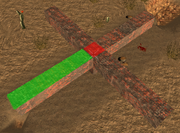(Including the math) |
(Changed layout so that the example follows the math.) |
||
| Line 1: | Line 1: | ||
== Overview == |
== Overview == |
||
'''{{PAGENAME}}''' of a material determines how much load ([[Mass]]) every side of it can hold. You can obtain this information using the Item Stats functionality added to the game in the alpha 7.6. To do this, place the mouse over an item to see the Object Stats, including its '''{{PAGENAME}}'''.<br> |
'''{{PAGENAME}}''' of a material determines how much load ([[Mass]]) every side of it can hold. You can obtain this information using the Item Stats functionality added to the game in the alpha 7.6. To do this, place the mouse over an item to see the Object Stats, including its '''{{PAGENAME}}'''.<br> |
||
| ⚫ | |||
| − | |||
| ⚫ | |||
| ⚫ | |||
| ⚫ | [[Brick]] has a {{PAGENAME}} of 65 and a [[Mass]] of 13. Each side of the block may hold up to 65 mass. This means the player may connect five [[Brick]] |
||
== Use == |
== Use == |
||
| − | {{PAGENAME}} is used together with [[Mass]] to calculate [[Structural Integrity]] and |
+ | {{PAGENAME}} is used together with [[Mass]] to calculate [[Structural Integrity]] and therefore planning structures of any sort. |
| − | |||
To do so, divide [[Max Load]] by [[Mass]] of the block and round down the quotient. |
To do so, divide [[Max Load]] by [[Mass]] of the block and round down the quotient. |
||
'''''[[Structural Integrity]]''' = RoundDown( [[Max Load]] ÷ [[Mass]] ) '' |
'''''[[Structural Integrity]]''' = RoundDown( [[Max Load]] ÷ [[Mass]] ) '' |
||
| + | |||
| ⚫ | |||
| ⚫ | |||
| ⚫ | |||
| ⚫ | [[Brick]] has a {{PAGENAME}} of 65 and a [[Mass]] of 13. Each side of the block may hold up to 65 mass (65 ÷ 13 = 5). This means the player may connect five [[Brick|Bricks]] to every side of a '''supported''' [[Brick]] block before the construction breaks. If you add a sixth block to one of the beams the whole beam collapses. Even if you make turns in your construction, if the {{PAGENAME}} for a side is reached the block breaks. |
||
== See also == |
== See also == |
||
Revision as of 00:47, 25 June 2014
Overview[ | ]
Max Load of a material determines how much load (Mass) every side of it can hold. You can obtain this information using the Item Stats functionality added to the game in the alpha 7.6. To do this, place the mouse over an item to see the Object Stats, including its Max Load.
Use[ | ]
Max Load is used together with Mass to calculate Structural Integrity and therefore planning structures of any sort. To do so, divide Max Load by Mass of the block and round down the quotient.
Structural Integrity = RoundDown( Max Load ÷ Mass )
Example[ | ]
The function of Max Load is easily explained using an example.

red = supported; green = five unsupported
Brick has a Max Load of 65 and a Mass of 13. Each side of the block may hold up to 65 mass (65 ÷ 13 = 5). This means the player may connect five Bricks to every side of a supported Brick block before the construction breaks. If you add a sixth block to one of the beams the whole beam collapses. Even if you make turns in your construction, if the Max Load for a side is reached the block breaks.
